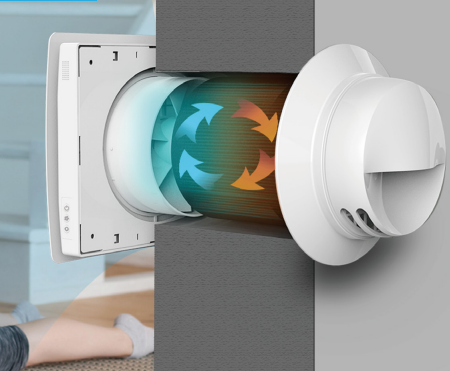Why HRV Is a Wise Investment for Modern Homeowners
Wiki Article
Discovering the Perks of Heat Recovery Ventilation for Power Efficiency in Residences
Heat Recovery Ventilation (HRV) systems offer house owners a useful technique to improving energy efficiency. By redeeming heat from outbound air, these systems can considerably lower heating and air conditioning prices. Furthermore, they give a stable supply of fresh air, boosting indoor air quality and comfort levels. As home owners take into consideration sustainable options, comprehending the subtleties of HRV systems comes to be progressively crucial. What elements should one evaluate before making such an investment?Recognizing Heat Recovery Ventilation Solutions

Exactly How HRV Enhances Indoor Air Quality

Power Savings: The Financial Advantages of HRV
Maximizing energy effectiveness, heat recovery ventilation (HRV) systems use considerable monetary advantages for home owners. By recovering and reusing warmth from exhaust air, HRVs substantially lower cooling and heating costs. This innovation can lead to energy financial savings of as much as 30%, depending on environment and use patterns. Property owners often notice lowered energy costs soon after setup, making HRVs a financially wise financial investment with time. Furthermore, several areas supply rewards or refunds for energy-efficient upgrades, even more enhancing the monetary allure. As power rates continue to climb, the cost-effectiveness of HRVs ends up being progressively clear. Overall, the anonymous unification of HRV systems not just promotes power effectiveness however likewise adds to long-term economic savings for houses.The Environmental Influence of Heat Recovery Ventilation
A considerable ecological advantage of heat recovery ventilation (HRV) systems hinges on their capability to lower total energy usage. By redeeming warm from exhaust air and moving it to inbound fresh air, HRV systems minimize the requirement for energy-intensive home heating and cooling approaches. This reduction in energy demand adds to decrease greenhouse gas discharges, as less fossil gas is required to preserve comfortable interior temperatures. Additionally, HRV systems boost indoor air quality by successfully trading stale air with fresh outside air, minimizing dependence on mechanical cooling view it systems that can damage the setting. Generally, the application of HRV systems sustains lasting living methods and aligns with global initiatives to deal with climate adjustment by advertising energy effectiveness in household setups.
Choosing the Right HRV System for Your Home
Just how can property owners guarantee they pick the ideal heat recovery ventilation (HRV) system for their requirements? First, they must assess their home's dimension and design, as these variables influence airflow needs. Next off, reviewing the system's efficiency rankings is crucial, as higher ratings indicate much better performance and energy savings. House owners should likewise take into consideration installation and maintenance prices, contrasting different brands and designs for worth. Additionally, it's vital to evaluate sound levels, as some systems operate more quietly than others. Consulting with heating and cooling experts can supply tailored recommendations based upon specific home problems. Taking a look at individual testimonials and service warranties can aid in making an informed decision, ensuring that the selected HRV system properly enhances indoor air quality and energy performance.Frequently Asked Questions

How Frequently Should I Clean or Keep My HRV System?
The regularity of cleaning or keeping a warmth recovery ventilation (HRV) system usually relies on use and ecological variables. Usually, it is a good idea to do maintenance every six months to assure peak performance and air quality.
Can HRV Systems Help In Reducing Humidity Degrees Inside?
HRV systems can effectively decrease interior moisture levels by exchanging stale, moist air with fresh, drier air from outdoors. HRV Heat Recovery Ventilation. This process aids preserve a well balanced indoor atmosphere, boosting this contact form comfort and preventing moisture-related problems
What Is the Life expectancy of a Regular HRV System?
The lifespan of a normal heat recovery ventilation (HRV) system differs, usually lasting in between 10 to 15 years. Regular upkeep can extend its effectiveness and functional life, making certain peak performance throughout its usage period.Are There Any Type Of Sound Concerns With HRV Systems?
Sound issues with HRV systems can arise, especially from fan operation. Numerous modern devices are made to decrease audio levels, ensuring they operate quietly while keeping effectiveness, which addresses possible disturbances in living atmospheres.Can I Install an HRV System Myself, or Do I Required a Professional?
The specific contemplated whether to install the heat recovery ventilation (HRV) system personally or employ an expert. Usually, while do it yourself setup is possible, proficiency warranties proper functionality and conformity with local building codes, improving system efficiency.Report this wiki page